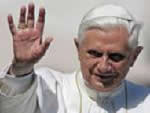|
Pope Benedict XVI- Angelus |
 Angelus
Message
Angelus
Message
On the Revolution
of Love
It "Changes the World Without Making Noise"
H.H. Benedict XVI
February 18, 2007
www.zenit.org
Dear Brothers and Sisters!
This Sunday's Gospel has one of the most typical, yet most
difficult, teachings of Jesus: Love your enemies (Luke 6:27).
It is taken from the Gospel of Luke, but it is also found in
Matthew's Gospel (5:44), in the context of the programmatic
discourse that begins with the famous Beatitudes. Jesus delivered
this address in Galilee, at the beginning of his public ministry: It
was something of a "manifesto" presented to everyone, which Christ
asked his disciples to accept, thus proposing to them in radical
terms a model for their lives.
But what is the meaning of his teaching? Why does Jesus ask us to
love our very enemies, that is, ask a love that exceeds human
capacities? What is certain is that Christ's proposal is realistic,
because it takes into account that in the world there is too much
violence, too much injustice, and that this situation cannot be
overcome without positing more love, more kindness. This "more"
comes from God: It is his mercy that has become flesh in Jesus and
that alone can redress the balance of the world from evil to good,
beginning from that small and decisive "world" which is man's heart.
This page of the Gospel is rightly considered the "magna carta" of
Christian nonviolence; it does not consist in surrendering to evil
-- as claims a false interpretation of "turn the other cheek" (Luke
6:29) -- but in responding to evil with good. (Romans 12:17-21), and
thus breaking the chain of injustice. It is thus understood that
nonviolence, for Christians, is not mere tactical behavior but a
person's way of being, the attitude of one who is convinced of God's
love and power, who is not afraid to confront evil with the weapons
of love and truth alone. Loving the enemy is the nucleus of the
"Christian revolution," a revolution not based on strategies of
economic, political or media power. The revolution of love, a love
that does not base itself definitively in human resources, but in
the gift of God, that is obtained only and unreservedly in his
merciful goodness. Herein lies the novelty of the Gospel, which
changes the world without making noise. Herein lies the heroism of
the "little ones," who believe in the love of God and spread it even
at the cost of life.
Dear brothers and sisters: Lent, which begins this Wednesday, with
the rite of the distribution of ashes, is the favorable time in
which all Christians are invited to convert ever more deeply to the
love of Christ.
Let us ask the Virgin Mary, the docile disciple of the Redeemer, to
help us to allow ourselves to be conquered without reservations by
that love, to learn to love as he loved us, to be merciful as our
heavenly Father is merciful (Luke 6:36).
[After praying the Angelus, the Holy Father offered the following
words of congratulation:]
In various Eastern countries, the lunar new year is celebrated
today, with joy and within the intimacy of families. To all those
great peoples, I send heartfelt wishes for serenity and prosperity.
[The Holy Father greeted pilgrims in several languages. In English,
he said:]
I greet all the English-speaking pilgrims and visitors present at
today's Angelus, including a group of American confirmation
candidates from Hohenfels and Garmisch in Germany. As we prepare to
enter the holy season of Lent, let us recognize our sins and
weaknesses, and deepen our desire to forgive and to grow in
compassion. Upon all of you and your loved ones, I invoke the joy
and peace of Christ the Lord!
Look at the One they
Pierced!
This page is the work of the Servants of the Pierced Hearts of Jesus and
Mary